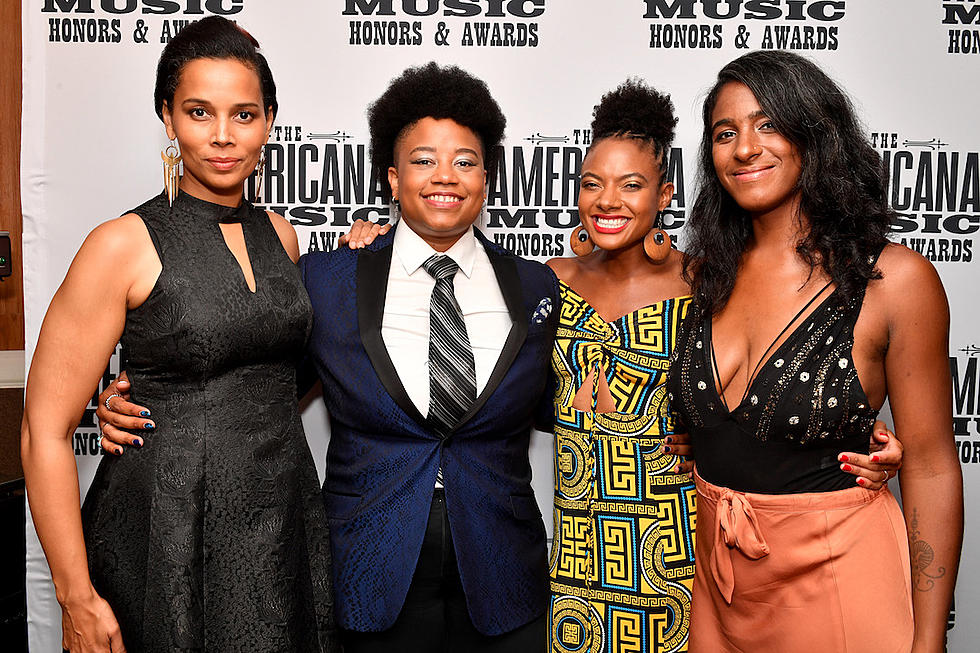
Our Native Daughters Tell Updated, ‘Crucial’ Stories of Black Women Throughout American History
On the red carpet leading up to the 2019 Americana Honors & Awards ceremony, Our Native Daughters explained to The Boot that they were honored by their nomination (in the category of Duo / Group of the Year), but perhaps even more excited to be nominated on the heels of an album consisting of retooled and updated historical stories, told from the perspective of black women.
"I think that's a beautiful distinction," the group's Allison Russell explains of not only being nominated, but being nominated surrounding such an important project. "I think we all felt the spirits in the room when we were singing together and writing together, and felt that sense of standing on the shoulders of our ancestors.
"We are our ancestors' wildest dreams," she adds. "They couldn't have imagined the kind of agency and freedom that we have."
Our Native Daughters consists of Rhiannon Giddens, Amythyst Kiah, Leylah McCalla and Allison Russell. On their 2019 album, Songs of Our Native Daughters, the quartet brings old folk songs and slave spirituals back to the surface, re-framing them for modern ears. From triumphant (such as in "Black Myself") to grief-stricken (in "Mama's Cryin' Long"), the project casts an eye toward America's turbulent history of oppression.
Listeners to Songs cannot mistake the project for a look back at no-longer-relevant issues. While the circumstances may have changed, the problems raised in its songs still exist today. Nowhere is this fact clearer than in "Barbados," the album's third track: The first lines speak from the perspective of a white person living in time of American black slavery, who is troubled by the moral ramifications of commodifying human lives, but finds reasons not to speak out against the slave trade.
"What? Give up our desserts, our coffee and tea?" the person worries when confronted with the prospect of giving up slave-harvested sugar products, adding that if Americans gave up purchasing black slaves, those same people would simply be bought by "the French, Dutch and Danes." Though today's listeners may view this narrative as a purely historical one that has little to do with them today, the verses that follow draw a clear connection between slavery in the 17th and 18th centuries and mine workers and child laborers today.
"I pity them greatly, but I must be mum / For what about nickel, cobalt, lithium? The garments we wear, the electronics we own / What? Give up our tablets, our laptops and phones?" the song continues. "Sitting here typing, it seems well worth the price / And you there, listening on your favorite device / This bargain we're in, well, it's not quite illicit / So relax, my friend, we're not all complicit," the lyrics add, speaking directly to listeners about the choices they make -- and what atrocities, in fact, these choices may support.
As much as Songs is informed by the past, Our Native Daughters agree that they're equally focused on the future -- and the future of women and artists of color in music and beyond. "For the future of the world, women taking their places as equals is kind of crucial," the band points out. "We're not going to survive as a species, I believe -- kind of heavy, but that's my view -- if we can't acknowledge the equality of women and uplift women's contributions, and appreciate them and acknowledge them."
With the advent of groups such as the Highwomen, along with an ever-louder conversation surrounding women's equality in country music, Our Native Daughters see reason to hope for a more balanced future. "Because [women and artists of color] have always been there. It's not like it's new," they go on to say. "It's just that -- hopefully -- there's more awareness of the prejudice that's come before, and the marginalization that's come before, and we're shifting that dialogue."
As for the future of their band, specifically? "We're gonna get matching Nudie Suits and we're gonna get a big Cadillac Escalade," jokes Giddens.
"But no, I don't know what's gonna happen," she continues, adding that one thing the four artists do know as that they'll continue working together. "We love writing together, and we really enjoy playing together, so we know there's something. Exactly what, when and how, we're still figuring that out. But what I've heard everybody [in this group] say, at one point or another, is that this collaboration just means a lot."
That's true not only because of the friendship and creative synergy between the four women, but also because the group allows them a break from the position of being the only artist of color in a given situation. Though the Americana genre has seen the emergence of artists such as Yola, the War and Treaty and J.S. Ondara, it is still a largely white field.
"[This group] allows us to escape our lonely position as the only one," Giddens adds. "It's not just like, 'Oh look, we're a group of black women, yay.' We each have a connection to the music that is very similar, as well, [in terms of] what we think is important. That's kind of rare. And the fact that we all happen to represent these things, it's a lot of things coming together. It's really beautiful."
5 Unforgettable Moments From the 2019 Americana Honors & Awards Ceremony
More From TheBoot









